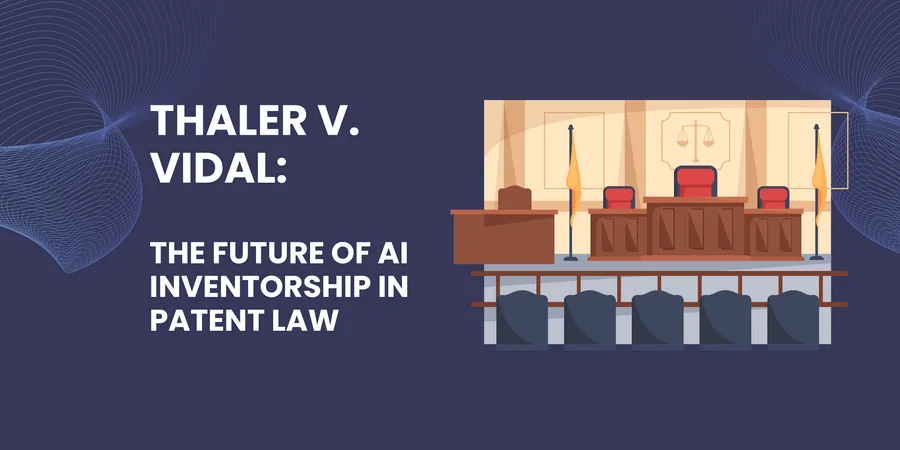As we hurtle towards an era dominated by technological advancements, we’re constantly greeted with cases that test the boundaries of our legal system. One such case that has captivated the attention of technologists, lawyers, and corporations alike is the Thaler v. Vidal case.
This blog post delves deep into the implications of this groundbreaking case, exploring its significance for the world of artificial intelligence (AI) and the ripple effect it may have on corporate strategies.
- Understanding the Background: The Case at a Glance
- Why is this Case so Important for Artificial Intelligence?
- The Implications for Companies
- Corporate Adaptations Post-Decision
- How are Companies Planning to Utilize the Decision?
- Conclusion: The Road Ahead
Understanding the Background: The Case at a Glance
- The Players: The case involves Stephen Thaler, an AI enthusiast and creator of an AI model, who is bringing suit against Katherine K. Vidal, Under Secretary of Commerce, specifically with the US Patent and Trademark Office.
- The Issue: The central question revolves around whether an AI can be listed as an inventor in a patent application, thus retaining all the legal rights that would be bestowed upon said ‘Inventor.’
- The Decision: The Federal Circuit held that AI cannot be recognized as inventors; only humans can be.
Why is this Case so Important for Artificial Intelligence?
- Redefining Inventorship: The classic definition of an inventor has always revolved around human beings. With AI models increasingly making contributions to new inventions, the Thaler v. Vidal case brings forward the question: can non-human entities claim inventiveness?
- Highlighting the Capabilities of AI: The very fact that such a case has reached the courts signifies the advancements AI has made. It demonstrates AI’s ability to come up with novel solutions, previously thought to be the domain of human intellect alone.
- Testing the Legal Framework: This case tests the elasticity of the current legal framework, challenging it to adapt to the rapid technological evolution we are witnessing.

The Implications for Companies
- Restructuring R&D: With AI not being recognized as inventors, companies might need to re-evaluate their research and development strategies. AI could be used to assist human researchers rather than independently coming up with inventions.
- Investment in AI: Corporations might reconsider their investment strategies. If AI cannot hold patents, some companies may deem it less lucrative to invest in AI-driven research.
- Licensing and Rights: Since AI cannot be inventors, humans will hold the rights to any inventions. This might make licensing more straightforward but could also lead to legal battles over ownership.
Corporate Adaptations Post-Decision
- Boosting Human-AI Synergy: Companies may advocate for collaborative research where AI augments human innovation rather than functioning autonomously.
- Capitalizing on AI in Data Analytics: AI’s proficiency in analyzing extensive data can spotlight potential innovation avenues that human teams can further develop.
- Education and Training Drive: There might be an upswing in programs designed to train human researchers to synergize with AI, optimizing the combined strengths of both.
- Revamping Patent Approaches: Companies could recalibrate their patent application methodologies, accentuating human involvement even in AI-aided innovations.
How are Companies Planning to Utilize the Decision?
- Enhancing Collaborative Efforts: Instead of allowing AI to work in isolation, companies might focus on human-AI collaborative research, ensuring a human touch at every innovative step.
- Leveraging AI for Data Analysis: AI can play a significant role in sifting through vast data to pinpoint potential areas of invention, which human researchers can then pursue.
- Educational Initiatives: The ruling could lead to a surge in educational initiatives, training human researchers to work hand-in-hand with AI, ensuring a seamless integration of technology and human intellect.
- Re-evaluating Patent Strategies: Companies might need to rethink their patent application strategies, focusing on highlighting human contribution even in AI-assisted inventions.

Conclusion: The Road Ahead
The Thaler v. Vidal case is a testament to the complex interplay between law and technology. While the decision might seem like a setback for AI enthusiasts, it emphasizes the significance of human creativity and innovation. As AI continues to advance, it will be intriguing to witness how our legal systems adapt to these changes. For now, corporations have a clear guideline: integrate AI into the human inventive process, ensuring that every invention has a human touch.
With AI constantly evolving, it’s anyone’s guess how the law will keep up. But one thing’s for sure: AI isn’t going anywhere. It’s a thrilling time to be alive, and we’re here for all the drama that unfolds!
